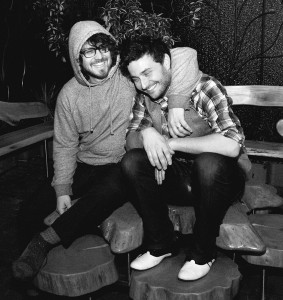Indie-pop band explores artistic identity
Writing songs for its next album, recording demos in the studio and playing the Echoplex in Los Angeles on Jan. 31 — Dale Earnhardt Jr. Jr.’s success story ultimately owes itself to a development of trust and steady artistic progression for Daniel Zott and Josh Epstein, who comprise the duo.

Band brothers · Daniel Zott (left) and Josh Epstein (right) are excited for their upcoming tour. Though they originally hadn’t planned on working together, their similar artistic visions made teaming up an inevitability. - Photo courtesy of Warner Bros. Records
“Josh Epstein and I knew each other for a little while, but we never thought to work together,” Zott said. “He heard that I came out with a solo record. He liked it and wanted to finish a song with me to see what happened.”
The product of this first meeting? The band’s breakout hit “Simple Girl,” which incorporates strong Simon & Garfunkel influenced harmonies over Epstein and Zott’s effortlessly catchy instrumental arrangements.
Even though the two make “Simple Girl” sound so simple, Zott admits it took time to adjust to working with another artist.
“When he called me, I was sort of reluctant at first. We’re creating music. There’s a level of trust that you need to have,” Zott said. “I respected his music, but you never know what it’s going to be like writing with someone.”
But after recording “Simple Girl,” Zott was sure: “We just kind of knew that ‘Man, OK, this is good. We should keep doing this.’”
Before the two had any idea what was happening, they had already completed an EP and attracted a loyal fan base. “It’s just a natural progression that we didn’t really expect,” Zott said. “We didn’t set out to be a band. We just started recording songs that people were liking. So, when that happens, you’re dumb to not jump on that opportunity — and we did.”
Epstein and Zott began brainstorming band names, such as Counting Crows Part II and other goofy titles that encompassed the idea of two silly guys jamming than a marketable band persona.
Even close friends, however, weren’t too keen on a name that read like a sequel to another band.
“One of our buddies was like, ‘That’s so stupid you might as well name yourself Dale Earnhardt Jr. Jr.’ And we realized that’s actually pretty sweet,” Zott said with a chuckle.
The two bandmates took the name and made something of it. Zott suggests that the name allowed the band to “present art in different formats” by dressing up in racing outfits and “being totally weird and then letting the music contrast with the way our name sounds.”
Apparently, even the real Dale Earnhardt Jr. applauded the name.
“Finding out that Dale Earnhardt [Jr.] wasn’t coming out after us and was actually really supportive made us excited to have a name like that,” Zott said.
In the summer of 2011, the band released its first full-length album, It’s A Corporate World. From the thumping drums of the record’s opening track “Morning Thought,” the album boldly makes a statement concerning the band’s core philosophy — the juxtaposition of the shallow and intimate.
“We have an outward surface-level appearance of being silly and being kind of simple. The reality is that every person is complex. We have complexities to us and we have songs that talk about a lot of crazy stuff that I think is important and poetic,” Zott said.
One issue that the band explores, for example, is evident in the title of its first album.
“Some of our reflections are that corporations are everywhere and everything is advertising — even ourselves,” Zott said, citing Facebook as an example of personal marketing. “We all see the world as a sort of business. That’s just how it is. There’s a greatness with corporations, but there’s also some annoying, destructive traits about them too. We’re just trying to start a conversation.”
Epstein and Zott have gotten involved in the conversation as well. Basing the decision on Zott’s philosophy that “life has so many different facts,” the band released not one, but two videos for the song “Nothing But Our Love.” One was expectedly quirky — “weird, goofy and funny,” as Zott puts it. But the second video resulted from a trip to the village of Sólheimar, located in Iceland, where the duo highlighted the story of a woman who had created the village as a place where residents could be free from all stereotypes and judgment.
“The government was telling her to fill the walls between the people so that there would be a separation between the mentally handicapped children and the ‘regular children.’ She didn’t want to do that,” Zott explained. “She was doing something amazing, saying these mentally handicapped children have value in a time when people were saying that they don’t.”
While the two made a statement with their story in Sólheimar, Zott doesn’t hold social responsibility as his duty as an artist. He did, however, find a connection between art and social commentary.
“If you’re an artist and you’re a human being and you’re trying to say something, you should be talking about what’s going on in the world and what you’re feeling,” he said. “You don’t do it on purpose. It just comes out.”

